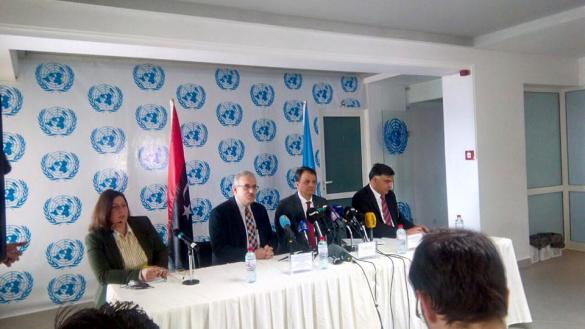Al-Thinni government’s health minister calls for release of Libyan assets

The Health Minister in Al-Thinni government in the east on Friday demanded the release of Libyan assets frozen abroad, saying the situation in his violence-ridden country was “dramatic”.
“The health situation in Libya is dramatic. We are currently unable to buy what is needed to treat the sick and wounded,” health minister Reida el-Oakley said at a press conference at the UN mission’s headquarters in Tunis.
“It’s ridiculous that Libya has to endure financial difficulties in order to ensure supplies of medicines for its people when billions of dollars are blocked” abroad, he said.
Oakley said even just “one percent” of such blocked funds would be enough to buy “medicines for Libyans for a year”.
In Tunisia, for example, he said there were some $295 million in frozen funds, and deplored the fact that approaches to the Tunisian central bank for more than a year had yielded nothing.
“Waiting for the establishment of a consensus government is a false pretext used by countries holding Libyan money,” he said.
Oakley urged “the international community to intervene” to help unblock these funds. “This is a humanitarian responsibility,” he said.
Chaos has engulfed Libya since the 2011 ouster of dictator Muamer Gaddafi, and rival administrations are being urged to sign up to a UN-brokered national unity government to help restore stability.
Al-Thanni government in which Oakley is a minister is based in the far east of the country, while another government, the Salvation Government operates from Tripoli.
The representative of the World Health Organization in Libya, Sayed Jaffar Hussain, was also at the press conference and said $50 million in immediate funding was needed.
“The world is interested in conflict zones in Iraq and Syria but forgets about Libya. It is a crisis that must be addressed. Children are not vaccinated and women give birth in their homes,” he said.
In January, Oakley said that persistent fighting in Libya had forced the closure or partial breakdown of 60 to 70 percent of its hospitals and that the country needed $3 million (2.7 million euros) per day to buy medicine.
Last October, the United Nations said that in a country of 6.3 million, “2.44 million people are in need of protection and some form of humanitarian assistance”.
How to submit an Op-Ed: Libyan Express accepts opinion articles on a wide range of topics. Submissions may be sent to oped@libyanexpress.com. Please include ‘Op-Ed’ in the subject line.
- Libya, Mozambique Advance Major Rice Project - January 16, 2025
- Libyan PM Holds Official Talks with Turkish President - January 16, 2025
- Analysis: Examining the Terms of Gaza’s New Ceasefire Agreement - January 16, 2025


